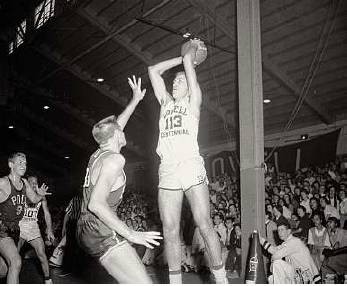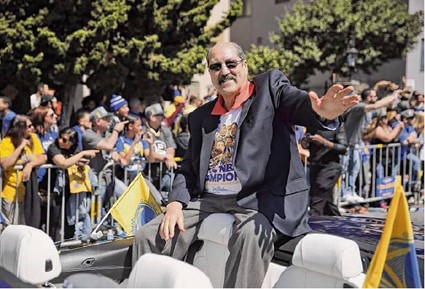|
On November 20, 2022 the San Francisco Chronicle published a feature article in its sports section lauding Tom Meschery as a San Francisco legend who has eluded the recognition he deserves. We have reprinted the article here in its entirety. |
![]()
S.F. legend deserves greater acclaim
Warriors mainstay Meschery eludes recognition despite wildly eclectic life
PETER HARTLAUB
Grant Elementary School on Pacific Avenue in San Francisco is long gone, closed more than a half century ago. So are the kids and their games, and the prejudices, bullying and social dynamics of that schoolyard.
But it all comes back to life when Tom Meschery talks about his first kickball game, in the late 1940s, when he nearly sent a ball flying off the property.
“I found that by kicking the ball very far, the other students liked me better,” Meschery says. “I wore short pants, I didn’t speak English very well. I was an outsider in that school. But I kicked the heck out of the ball. And after that, when they’re choosing teams, I got a little bit of cred. ‘Hey, let’s get Meschery …’ ”
A kickball game started the legend of Tom Meschery, the greatest Bay Area athlete you’ve probably never heard of. The Warriors forward’s number 14 is up in the rafters of Chase Center, alongside five championship banners and revered names including Chamberlain, Barry and Mullin.
But his NBA honors are just one vignette in a life story that’s Forrest Gump-ian in its eclectic romp through culture and history. Meschery’s grandmother was a Tolstoy. His family fled the Bolsheviks during the Russian Revolution, and he arrived in San Francisco after spending World War II in a prison camp in Tokyo. He started at small forward during Wilt Chamberlain’s 100-point game, taught high school English for 21 years and wrote poetry books. And now, at age 84, Meschery has just published his first novel: the detective mystery “The Case of the ’61 Impala.”
“I bet you if you asked Warriors fans to name the team’s retired uniforms, a lot of people will stumble when they get to Tom Meschery,” says former Warriors president Rick Welts, who was a Seattle SuperSonics ball boy when he met Meschery in 1969. “A lot of newer fans don’t know him. They definitely should.”
I used to be among that number, first “discovering” Meschery while looking at photos in the San Francisco Chronicle archive, and finding a 1964 image of Meschery surrounded by Senegalese children. On the back, in beautiful looping cursive, was a poignant letter to the Chronicle newsroom about how much he had learned during his NBA goodwill trip to Africa.
“I only wish there could be more time to work with these youngsters,” Meschery said, in closing. “We all agree that seven days are just not enough.”
Nothing in Meschery’s life is easy to describe in one sentence, including his playing career.

Meschery, later nicknamed “the Mad Manchurian,” starred for Lowell High before playing for St. Mary’s.
(Chronicle File 1956)
The athlete was a standout at Lowell High School; a 1956 photo in the Chronicle archive shows Meschery modeling perfect shooting form. He led a strong St. Mary’s team and was drafted by the Philadelphia Warriors. On the night Chamberlain scored 100, a rookie Meschery scored 17 points on 7-for-12 shooting. (And made both his free throws.)
But when the team moved to San Francisco and acquired one of the NBA’s best shooters ever, Rick Barry, the forward was needed for other skills: his sharp elbows. He changed from a Chris Mullin mold, with shooting touch and quick hands, into a lower-profile Draymond Green-like player — rebounding, setting screens and putting his attitude on full display while leading the league in personal fouls.
Meschery’s statistics were good, but he didn’t have Chamberlain or Barry scoring numbers. He stayed in the league for a decade, leaving the Warriors years before the team’s first championship in 1975. Barry and his coach Alex Hannum nicknamed Meschery “the Mad Manchurian,” which sports writers later changed into “the Mad Russian.” (He was born in Manchuria and prefers the former.) “I think that had to do with intensity,” Meschery explains now. “I was not a great athlete. I couldn’t jump as high as some of the guys. I wasn’t fast. And I had a little bit of a short fuse I must admit.”
But as that legend grew, his close friends and teammates knew that Meschery, as Welts describes, “is just a wonderful bunch of contradictions.” He hung out with erudite broadcasting legend Bill King on the team plane, talking about literature and music. The guy who wasn’t afraid to fight always had a book in his locker.
Tom “had just this terrifying demeanor if you had to go against him as an opponent, but away from the court he was this thoughtful, smart, well-read kind of guy who was so interested in the world around him,” Welts says. “That contrast of him as a player and the reality of him as a human being struck everybody. It certainly struck me.”

Tom Meschery taught high school English for 21 years and wrote poetry books after his Warriors playing days came to an end.
(Carlos Avila Gonzalez/The Chronicle 2015)
Meschery’s life changed when he met former U.S. Poet Laureate Mark Strand while with the Sonics, and sat in on Strand’s classes during nights the team wasn’t playing. Meschery received his master of fine arts degree at the University of Iowa, briefly ran a bookstore in Truckee, then taught English in Reno for two decades until his retirement in 2005.
For most of that time, Meschery was estranged from the Warriors organization. But when Joe Lacob bought the team in 2010, and Welts joined the organization in 2011, team leadership began bringing former players back into the fold.
Around the same time, Meschery was isolating during a multiple myeloma fight, and his son bought him an NBA League Pass for his TV. Meschery fell in love with his former team’s unselfish offense and joyful style that reminded him of his playground days.
“I thought, ‘I’ve been missing something. This game has morphed,’ ” he says. “It’s played in the air, like the playground games I used to love.”
On a recent weekday at Chase Center, Meschery recorded a Total SF podcast episode and talked about his early life in San Francisco, basketball career and new book.
“The Case of the ’61 Impala” follows twin brothers who own a used car dealership in the 1960s, becoming private detectives after a dead body is found in a trunk. The novel has no sports but is filled with street-level detail of Oakland and Alameda, complicated racial dynamics and real-life events; the Black Panthers, the death of Martin Luther King Jr. and a fictionalized version of the Hells Angels are in the plot.
The writer has also been working on a memoir (current title: “The Mad Manchurian”), which explores the contradictions in his life. How did a player known for an easily triggered temper become an English teacher who hardly ever raised his voice?
Meschery explains he was trying to fit in, and excelling at sports was his path to feeling like an American. “On the court it seemed to me that if someone was trying to better me, they were attacking the one thing I wanted most: To fit, to be part of a team, to be part of a tribe.”
I’ve seen him at Warriors events and in recent parades, but find myself dismayed that I have to explain to others who he is.
“He deserves a part of that history,” Welts says. “I hope we’ve been successful in making him feel that part of his life is going to be celebrated forever.”
The number of players who grew up in San Francisco and became stars on San Francisco teams is small, including Bob St. Clair with the 49ers and Phil Smith with the Warriors. The number of former players who became indie bookstore owners, published poets and might arrive at your home with a bottle of Russian vodka has to be exactly one.
It’s impressive to be one of the six retired numbers in 76 years of Warriors basketball. But I’m even more inspired by a man who continues to write, look for lessons from his past and be curious about the people he meets in the present. Tom Meschery’s playing career ended more than a half century ago. But he keeps proving there are more chapters to come.